One way trip to the Ganges
Bring out your dead
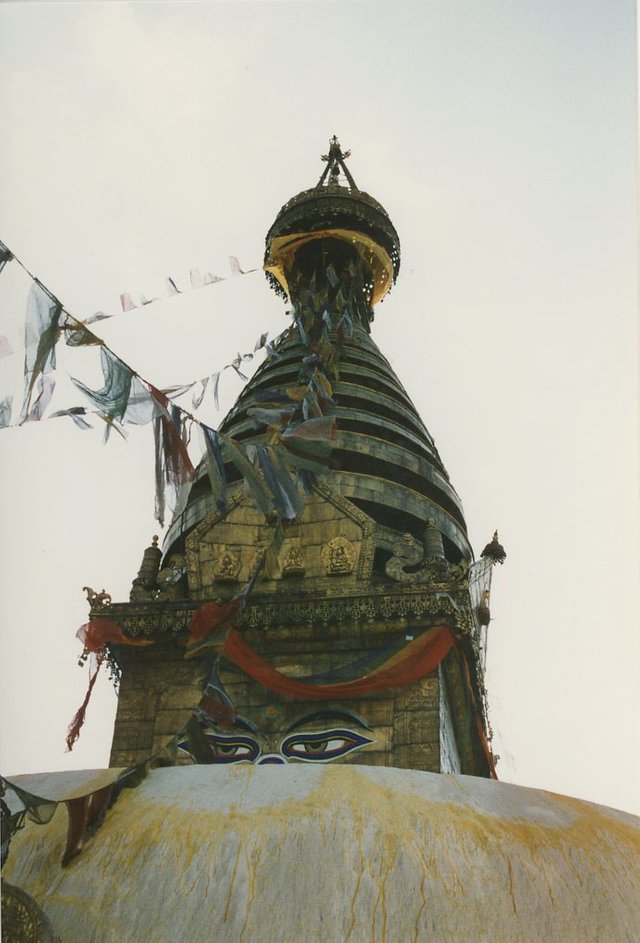
Except in Kathmandu, that’s really what they do. They bring their dead right down to the Bagmati River and cremate the remains right on the spot.
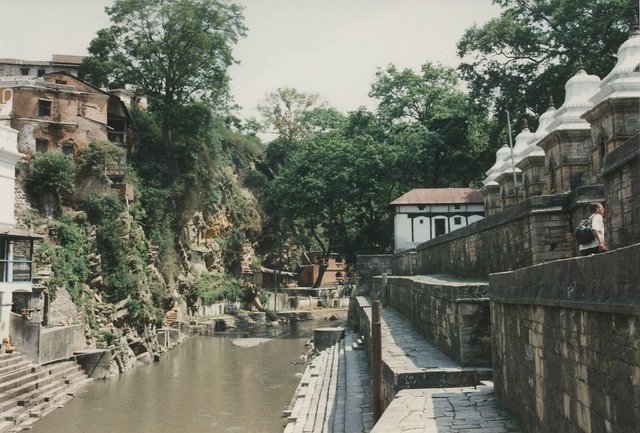
When you visit a place like Kathmandu after living in a place like California, your world turns upside down. You see things you never thought imaginable. And some things are not for the faint of heart.
Take the river. In cities, rivers do their things dividing sections with bridges that connect one neighborhood with another. But some bridges cross rivers at places that will blow your mind. Significant because if its eventual convergence with the holy Ganges, The Bagmati River at the site of Pashupatinath Temple is where Hindu citizens begin their final journey to the afterlife.
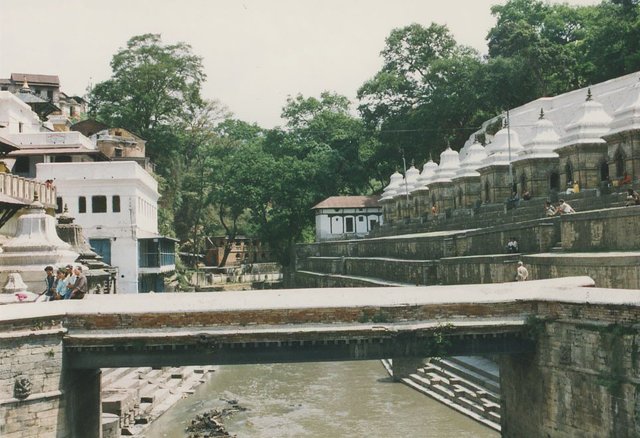
This spot is considered the holiest place in Kathmandu; people gather even before death to die here. I have never in my life seen actual funeral ceremonies where bodies are burned out in broad daylight. We live a sheltered life in the United States for the most part. It’s such a shock to see this personal connection to death when you come from a protected existence. Death is a funny thing in Western Culture. We squirrel away the dead quickly, wanting nothing to do with the processes before burial or cremation. Seeing this gives you a whole new appreciation for the transition we all ultimately face in a less frightening way. Here life and death coexist together. And no one seems bothered by it at all.
Notice the monkey chilling out - he's seen it all before.
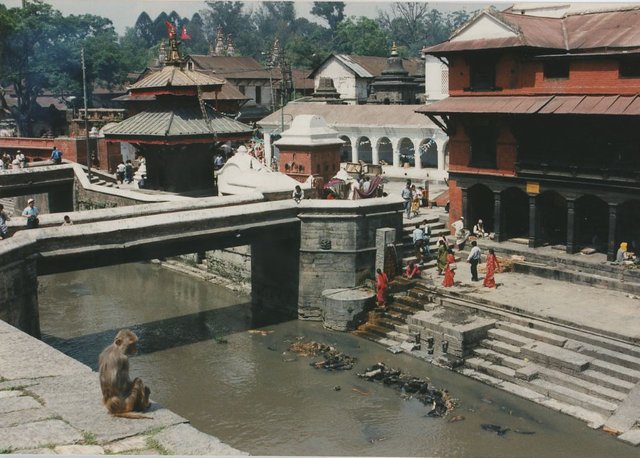
up and down the river you can see remnants of ash piled up in little pyres – these are human remains
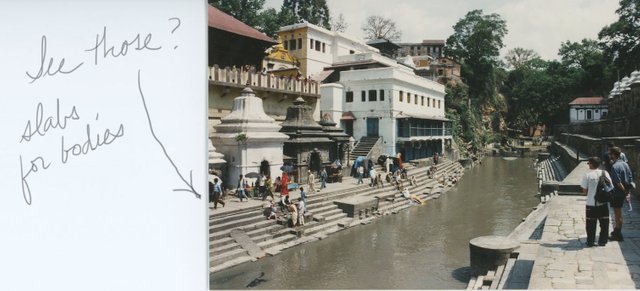
My initial reaction? Cool! I can’t f-ing believe this! With death and dying you have to be careful. We weren’t ogling a spectacle. This was raw, gritty, and oddly beautiful. It wasn’t a show put on for western tourists. This was life. And death. I admit I felt a little voyeuristic taking pictures.
Soon the reality hit me hard. These were bodies, mounds of burned human remains. Family members were mourning, but weren't put off by the ashes and unburned stacks of remains. These were people’s mothers and fathers, sons and daughters, cousins, aunts and uncles. They were dead. Really dead. And this is what was left. We would all burn the same way. That could be me down there. I felt overwhelmed and weak, like I was going to pass out. The smell wafted up towards where we were standing. Don’t think you can light a body on fire and not smell anything. The smell was acrid and almost sweet – more than burned flesh. There was also a tinge of burned fat - must have been. It wasn't long before it all became too much and we had to leave.
The whole experience was intense - more emotionally draining than anything else. I will never forget what I saw and how it made me feel - strangely privileged to catch an outsider’s peek into the culture of death in Kathmandu.
The end of the day gave way to reflection. This is how I felt. And I was pretty R E K T (that's for my daughter Catherine).
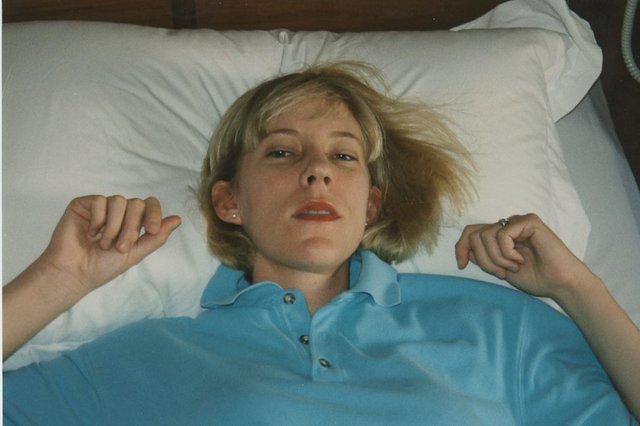
Yes, death is one of the most important topics in everyone's life. Because each of us is doomed to go through this experience. Unfortunately, modern western culture hides death.
And that's bad. Because death cleanses us from all superfluous. From all superficial. If today was your last day - will you do what you plan to do? Can your life values and goals survive in the face of death?
I think that these questions can make a person more responsible and more alive. Oddly enough, but life really begins only after you see death face to face. It's like you wake up. And find that the purpose for which you live looks ridiculous in the face of death. And in that moment, you feel a strong impulse to change everything. Strange as it may seem, but death helps to live more fully and consciously.
Thanks a lot for sharing deep and enlightening thoughts, @fairytalelife - looking forward to your next post.
How right you are, @omfedor. Thank you for your comment. Good questions to always ask ourselves -
thanks for sharing,
I was married once (ONCE!!!) to a Japanese lady, it was nice.
Over the course of 8 years, I learned much about other cultures that caused me to question my traditional upbringing. The funeral thing I find curiously cosmetic, we fix up the body so it looks good, and then hide it away before it begins to go bad. Says a great deal about us I think.
My ex-wife told me about how the Japanese Shinto Buddhists deal with death. They wrap the body up, place it on a steel grate high above, and ignited. Below the immediate family has a wake, they eat/drink, and relate stories about the diseased, honoring them, and all they while they act as though the loved one is there with them as they party.
After the meal and cremation, only the most immediate family, parents, spouse, and offspring, gather round the remains and SIFT through the ashes for the bones. They each pick out the bones and place them in a container to be buried and the ashes are divided up among the group.
At each house you'll find alters, usually in their own room, or in the master bedroom. These alters contain the ashes of those they knew and loved, and inside each cabinet are photos of the person. It is believed they hang out near each of their alters, and watch over the living.
I had to particpate in this as well when my wife's grandmother passed away.
The tricky part is how two people have to pice up a bone fragment together and place it in the jar with long chipsticks. I've liver here long enough that they are no second nature on my own but I surely didn't want to be the one fumbling a piece of grandma when It came my turn. But it was fine, I teamed up with my middle son and it went smooth. The mother-in-law place grandmas glasses that she always wore on the top of the bones and then closed up the lid.
The family goes to the graveyard a couple times a year to wash the head stones with a scrub brush and I've gone a number of times to clean up the ancestors graves. And they alos have a little memorial shrine in the house that they will put out some food and right the bell to remember them as well.
That's a fascinating ritual. It sounds like a beautiful way of celebrating life. Death is not to be feared. It's a transition. But here in our culture, we want nothing to do with it.
Man.. powerful...
Like most people my age i have suffered the loss of people close to me.. Unfortunately i also lost too many friends in my teenage years as well...
It does give a person perspective though and make you appreciate things a little more...or a little less in some cases...
Your post was very thought provoking, in a good and bad way, thank you x
Thank you, @b0y2k. I appreciate it!
@fairytalelife this is the traditional hindu way of cremation. Doing it by the ganges or submerging the ashes into Ganges is seen as the road to heaven.
He is like so
Interesting article! I’ve always been drawn to India and hope to some day experience it. I’d really like to visit Paramahansa Yogananada’s birthplace.
I upvoted You
I went there a few years ago! Watching bodies get cremated in broad daylight is such a bizarre experience, isn't it? I think the way other cultures see death is inspiring.
I hope you enjoyed Katmandu! Did you visit the Kumari Chen yet? Looking into the eyes of a real world living goddess is almost as shocking as watching other people's funeral rites.
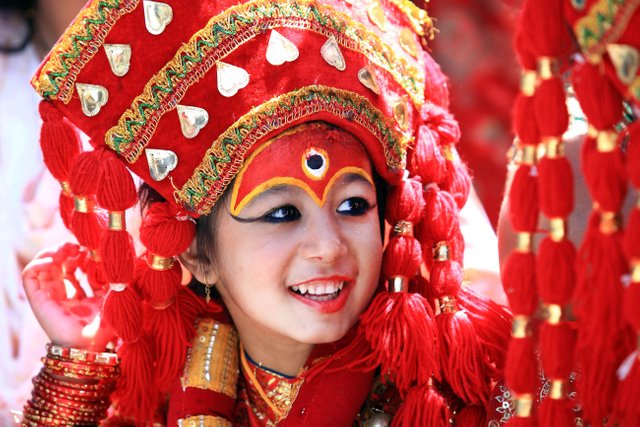
At what point does this tradition become a health hazard?
The western tradition of ignoring death is already a health & moral hazard.
The Death of Ivan Ilyich, is an unassuming short story by Leo Tolstoy (the famous author of "War and Peace") published in 1886.
Many top medical schools in the United States have it up as required reading for all its graduates, because the little book really exposes the invisible and unfathomable underbelly of how people with so-called Westernized values tend to relate to death, how they are taught to regard it through a lens of terror and the incumbent numbness, the unfeeling denial that naturally follows.
If you can't go to India, find the little book, read it. Your eyes may water a little, but they will be opened like never before.
I am inspired to find it, @cogliostro
I always wanted to visit Katmandu for some reason. My friend has drawn that name all over his notebook. Must've passed it on me. I am now positive I will visit it one day.
You definitely should! Nepal is such a special place. It's very poor and polluted, though. Don't expect luxury like we have in the west.